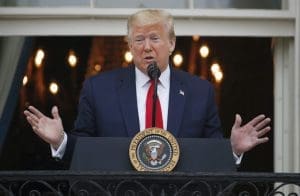Lawmakers tell Trump to cancel costly 4th of July 'vanity project' in DC
Members of Congress say Trump’s plan will cost the District of Columbia millions of dollars and take resources away from the coronavirus response.

Ten Democratic lawmakers whose districts and states border Washington, D.C., called for Donald Trump to cancel the massive July 4 display he’s set to host on the National Mall, saying it’s inappropriate to hold it during the COVID-19 pandemic.
“The administration, including your agencies, should be focused on helping American families, not on a vanity project for the president,” reads a letter from the lawmakers, who include: Maryland Democratic Sens. Chris Van Hollen and Benjamin Cardin of Maryland; Del. Eleanor Holmes Norton of the District of Columbia; Maryland Democratic Reps. David Trone, Anthony Brown, Jamie Raskin, and Steny Hoyer; and Virginia Democratic Reps. Don Beyer, Gerry Connolly, and Jennifer Wexton.
In advocating against holding the event, the lawmakers said it will cost Washington, D.C., millions of dollars the city doesn’t have as it faces a budget shortfall thanks to the coronavirus fallout.
They added that given coronavirus cases in the region are growing, it’s unsafe to have thousands come to the city and risk not only spreading the virus in D.C. but also bringing it back to the areas they were visiting from.
“We believe such an event would needlessly risk the health and safety of thousands of Americans. Further, this event would come at the cost of millions of taxpayer dollars while we are facing an unprecedented economic downturn due to the pandemic,” the lawmakers wrote in the letter.
Trump first held the “Salute to America” in 2019, which drew a barrage of criticism as he appeared to use the military to bolster his own political standing. The District of Columbia had held its own massive fireworks display for years, but Trump inserted himself into the festivities by organizing his own concert and giving a speech at the Lincoln Memorial.
Trump had wanted the event to include a military parade down the streets of the city that included tanks and other military vehicles, even though experts said those vehicles could damage city streets. The parade was eventually nixed, and instead, smaller tanks were stationed nearby the celebration.
The event ultimately cost the federal government millions. It also cost D.C. $1.7 million, which wound up wiping out a fund the city had to defend against terrorist threats.
This year, members of Congress said taking from D.C.’s budget would be wrong.
“With the catastrophic hit that our economy has taken due to the COVID-19 crisis, it is not only financially wasteful to plan a second ‘Salute to America’ event, but has the potential to again inappropriately pull funds from necessary accounts already under financial strain,” the letter reads.”
Washington, D.C., for its part, received a fraction of the coronavirus aid it could have gotten because it is classified as a territory rather than a state.
The city, whose 700,000 population is bigger than two states, got $700 million less in relief due to its classification, according to the Associated Press.
Trump has said D.C., “will never be a state,” claiming that doing so would only increase Democratic representation in Congress.
Published with permission of The American Independent Foundation.
Recommended

Biden campaign launches new ad focused on Affordable Care Act
Former President Trump has said he wants to do away with the popular health care law.
By Kim Lyons, Pennsylvania Capital-Star - May 08, 2024
Ohio doctors fear effects of emergency abortion care case set to go before U.S. Supreme Court
A federal law that allows emergency departments to treat patients without regard to their ability to pay will be under U.S. Supreme Court scrutiny this week, and Ohio doctors are concerned about the case’s local impact on emergency abortion care.
By Susan Tebben, Ohio Capital Journal - April 23, 2024
House GOP votes to end flu, whooping cough vaccine rules for foster and adoptive families
A bill to eliminate flu and whooping cough vaccine requirements for adoptive and foster families caring for babies and medically fragile kids is heading to the governor’s desk.
By Anita Wadhwani, Tennessee Lookout - March 26, 2024









































































